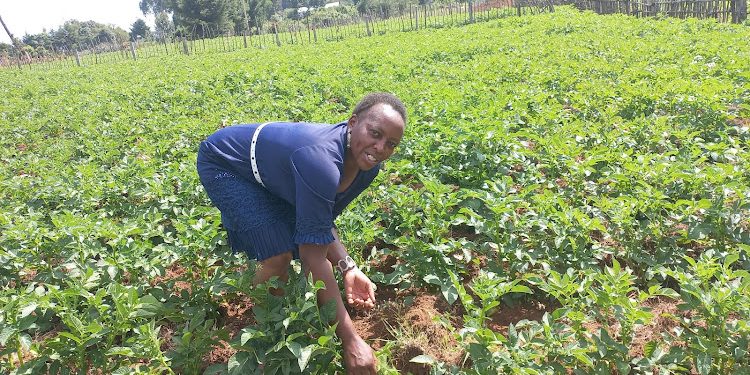In Narok and Nyandarua, potato farmers have united to form cooperative societies, aiming to secure better market opportunities and access to high-quality certified Irish potato seeds. This initiative is expected to boost their profitability and enhance the quality of their potato production.
Joseph Ngugi, a member of the Lanyuak Farmers Cooperative Society Limited in Narok North, explained that the cooperative was established to help farmers access the market for Irish potatoes and protect them from exploitation by brokers and middlemen.
“We started as 20 farmers seeking solutions to the challenges faced by potato farmers in the area,” Ngugi said. The cooperative, founded in 2013, has grown significantly since then.
The farmers received training and support from organizations such as the National Potato Council of Kenya, Kenya Agricultural and Livestock Research Organization, and the Narok government. They also benefited from exchange visits to other potato farmers in Eldoret, Nakuru, and Nyeri, and attended a potato exhibition and expo at the KALRO headquarters in Nairobi.
With this knowledge, they began growing potato seedlings with technical support from the Kenya Plant Health Inspectorate Services. Initially, they planted the Shangi potato variety on half an acre, and later expanded to the Kenya Mpya variety with support from the Narok county government.
The cooperative has since expanded to over 1,200 members from 56 different groups across Narok North, Narok South, Narok West, and parts of Trans Mara. Members benefit from affordable, certified potato seedlings, which are sold at a discount to cooperative members.
In a good season, farmers can harvest 70-150 bags (50kg each) per acre using certified seeds. The market price for a bag of Irish potatoes ranges from Sh2,000 to Sh4,000, depending on the season. Ngugi noted that using certified seedlings has doubled his yields and assured a ready market through collective aggregation.
Beth Wangari, a potato farmer in Dundori, Nyandarua county, and member of the Green Silver Cooperative, highlighted the challenges of high production costs, including fertiliser, certified seedlings, and labour. However, the cooperative provides loans to help farmers purchase necessary inputs and find good market prices without middlemen exploitation.
David Kimotho, chairman of Green Silver Cooperative, which started in 2016 as Good Time Self Help Group, said the cooperative now has 500 members. They engage in contract farming for different potato varieties based on market preferences. Kimotho emphasized the challenge of accessing quality and affordable fertiliser, despite government subsidies.
Prof. Wycliffe Oboka, Director of the Institute of Cooperative Development at the Cooperative University of Kenya, discussed their role in linking cooperatives with markets through the Kenya Rural Transformation Centres Digital Platform project. This three-year project, supported by the African Development Bank, aims to connect farmers with various actors along the agricultural value chain.
The project is being piloted in Nakuru, Narok, Nyandarua, and Baringo counties, focusing on dairy, maize, and Irish potatoes. Prof. Ken Waweru, Director of Research and Innovation at CUK, said the goal is to create a digital platform to integrate agricultural players and eliminate middlemen, thereby enhancing farmers’ incomes.
The project, funded at Sh105.4 million, is part of the government’s Bottom-up Economic Transformation Agenda and aims to impact over 100,000 farmers by March 2025.







